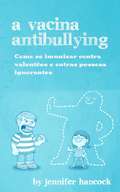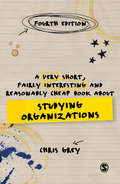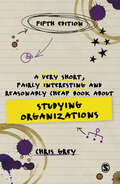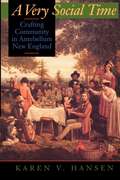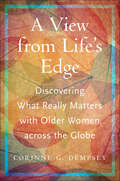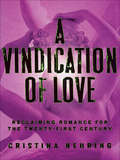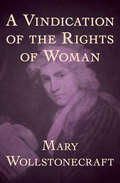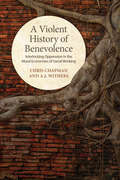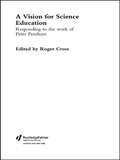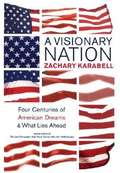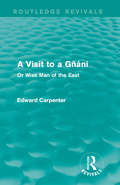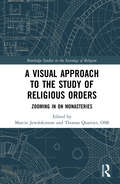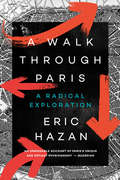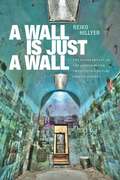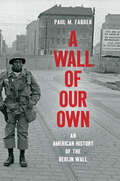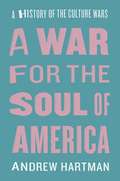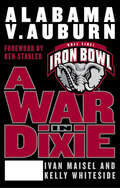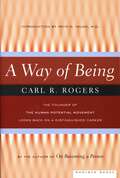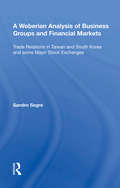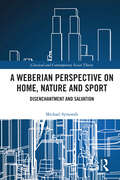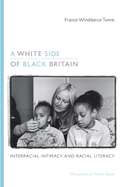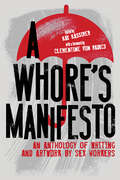- Table View
- List View
A Vacina AntiBullying
by Jennifer Hancock Laís Castilho BarretoEste livro foi projetado para ajudar os pais a vacinar seus filhos contra valentões e outras pessoas ignorantes e desagradáveis. Ao preparar-se para elas com antecedência, você pode se imunizar efetivamente contra o pior de seu comportamento. A técnica e os recursos ensinados neste livro são baseados no condicionamento operante. Em outras palavras, lhe ensinarei como treinar o valentão para te deixar em paz. E sim, realmente funciona. No livro, lhe ensino: Por que os valentões praticam bullying e o o que os faz atacar Como parar o bullying utilizando condicionamento operante, e Como se tornar corajoso frente aos verdadeiramente desagradáveis
A Very Short, Fairly Interesting and Reasonably Cheap Book About Studying Organizations (Very Short, Fairly Interesting & Cheap Books)
by Chris GreyThe first two editions of this book were a runaway success with students who loved the lively, focused and challenging discussion of classical and current ideas about organizations and their management.<P><P> This new edition, which can be used across a range of management courses, has been updated in light of the continuing financial and economic crisis. It shows how this grew out of a thirty year experiment in 'new capitalism' and links this to changes in the world of work organizations in terms of growing insecurity and inequality and to shifts in the status of management. Containing a new foreword, the third edition provides a challenging discussion of core, classical ideas but also covers issues such as new forms of control, identity regulation and the ethics and politics of studying organizations.<P> Chris Grey shies away from the sterility of conventional textbooks, offering students an accessible and palatable overview of the field of organization studies that questions and challenges the traditional literature.
A Very Short, Fairly Interesting and Reasonably Cheap Book About Studying Organizations (Very Short, Fairly Interesting & Cheap Books)
by Chris Grey'Indispensable and subversive' - Simon Caulkin, The Observer 'A highly entertaining polemic.... This slim volume more than lives up to its title' - Stefan Stern, Financial Times The Fourth Edition of Studying Organizations explains the unfolding consequences for organizations of the global financial and economic crisis, has been updated with examples from the biggest recent news events, and incorporates the latest research studies and up-to-date statistics. Conceived by Chris Grey as an antidote to conventional textbooks, each book in the ‘Very Short, Fairly Interesting and Reasonably Cheap’ series takes a core area of the curriculum and turns it on its head by providing a critical and sophisticated overview of the key issues and debates in an informal, conversational and often humorous way. Suitable for students of organizational studies and management, professionals working in organizations and anyone curious about the workings of organizations. The accompanying regularly updated blog, read by thousands of people worldwide, keeps the book bang up to date: http://author-chrisgrey.blogspot.co.uk
A Very Short, Fairly Interesting and Reasonably Cheap Book About Studying Organizations (Very Short, Fairly Interesting & Cheap Books)
by Chris Grey′Indispensable and subversive′ - Simon Caulkin, The Observer ′A highly entertaining polemic.... This slim volume more than lives up to its title′ - Stefan Stern, Financial Times Conceived by Chris Grey and written to get you thinking, the ′Very Short, Fairly Interesting and Reasonably Cheap’ series offers informal, conversational and critical overviews of popular areas of study. Updated throughout with examples from the biggest global news events, including the Trump presidency, cost-cutting at Boeing, working conditions at Sports Direct and the fallout of the Covid-19 pandemic, the fifth edition explores contemporary developments in organizations. This book is ideal for students of organizational studies, management professionals and anyone curious about the workings of organizations. Chris Grey is Emeritus Professor of Organization Studies at the School of Business and Management at Royal Holloway, University of London, UK.
A Very Short, Fairly Interesting and Reasonably Cheap Book About Studying Organizations (Very Short, Fairly Interesting & Cheap Books)
by Chris Grey′Indispensable and subversive′ - Simon Caulkin, The Observer ′A highly entertaining polemic.... This slim volume more than lives up to its title′ - Stefan Stern, Financial Times Conceived by Chris Grey and written to get you thinking, the ′Very Short, Fairly Interesting and Reasonably Cheap’ series offers informal, conversational and critical overviews of popular areas of study. Updated throughout with examples from the biggest global news events, including the Trump presidency, cost-cutting at Boeing, working conditions at Sports Direct and the fallout of the Covid-19 pandemic, the fifth edition explores contemporary developments in organizations. This book is ideal for students of organizational studies, management professionals and anyone curious about the workings of organizations. Chris Grey is Emeritus Professor of Organization Studies at the School of Business and Management at Royal Holloway, University of London, UK.
A Very Social Time: Crafting Community in Antebellum New England
by Karen V. HansenKaren Hansen's richly anecdotal narrative explores the textured community lives of New England's working women and men—both white and black—n the half century before the Civil War. Her use of diaries, letters, and autobiographies brings their voices to life, making this study an extraordinary combination of historical research and sociological interpretation.Hansen challenges conventional notions that women were largely relegated to a private realm and men to a public one. A third dimension—the social sphere—also existed and was a critical meeting ground for both genders. In the social worlds of love, livelihood, gossip, friendship, and mutual assistance, working people crossed ideological gender boundaries.The book's rare collection of original writings reinforces Hansen's arguments and also provides an intimate glimpse into antebellum New England life.
A View from Life's Edge: Discovering What Really Matters with Older Women Across the Globe (Global Perspectives on Aging)
by Corinne G. DempseyIn today’s death-denying, success-driven society, older women’s countercultural voices call for our attention. Recounting emotionally charged conversations from across the world, A View from Life’s Edge reflects on women’s comfort with impending death, gratitude forged by catastrophe, and humility that makes way for wonder. Speaking with nearly one hundred women over the age of eighty in four locations—northern Iceland, south India, a retirement community in California, and a convent in upstate New York—Corinne G. Dempsey finds that, as we near life’s end, we gain clarity about what really matters in life. Women’s stories and reflections, in which sorrow and loss are central to a life well lived, help to expand our sense of what it means to be human. Drawing on the paradoxical wisdom of world religions and mystical traditions to frame late-life tendencies across cultures, Dempsey portrays these accounts as a corrective to mainstream values that defeat and diminish us. Dempsey encourages us to turn away from ageist fears rather than denying life’s inevitable end. Learning from older women’s perspectives, we might move their edge-of-life views closer to the center.
A Vindication of Love: Reclaiming Romance for the Twenty-First Century
by Cristina Nehring"A fierce and lively book. . . .This is one of those rare books that could make people think about their intimate lives in a new way." — New York Times Book Review “A rousing defense of imprudent ardor and romantic excess. . . . It’s difficult to deny that [Nehring] is on to something.” — Wall Street JournalA thinking person’s “guide” that makes the case for love in an age both cynical about and fearful of strong passion. Bold and challenging, A Vindication of Love has inspired praise and controversy, and brilliantly reinvigorated the romance debate. A perfect choice for readers of Alain de Botton’s How Proust Can Change Your Life and Pierre Bayard’s How to Talk About Books You Haven’t Read.
A Vindication of the Rights of Woman: Strengthen The Female Mind By Enlarging It, And There Will Be An End To Blind Obedience
by Mary WollstonecraftThis revolutionary work from the eighteenth century is one of the first tracts of feminist philosophy Mary Wollstonecraft wrote A Vindication of the Rights of Woman in opposition to the gender norms of the eighteenth century. In this seminal text, Wollstonecraft argues that women should receive a comprehensive education in order to benefit society. Women and men, she argues, are moral equals in the eyes of God, and women, at the time that Wollstonecraft was writing, occupied an inferior station because they were trained to serve only men rather than civilization as a whole. Written in response to Charles Maurice de Talleyrand-Périgord&’s assertion that women ought only to receive a domestic education and should be confined to the home, A Vindication of the Rights of Woman was a remarkably forward-thinking political text. This ebook has been professionally proofread to ensure accuracy and readability on all devices.
A Violent History of Benevolence: Interlocking Oppression in the Moral Economies of Social Working (G - Reference, Information and Interdisciplinary Subjects)
by Chris Chapman A.J. WithersA Violent History of Benevolence traces how normative histories of liberalism, progress, and social work enact and obscure systemic violences. Chris Chapman and A.J. Withers explore how normative social work history is structured in such a way that contemporary social workers can know many details about social work’s violences, without ever imagining that they may also be complicit in these violences. Framings of social work history actively create present-day political and ethical irresponsibility, even among those who imagine themselves to be anti-oppressive, liberal, or radical. The authors document many histories usually left out of social work discourse, including communities of Black social workers (who, among other things, never removed children from their homes involuntarily), the role of early social workers in advancing eugenics and mass confinement, and the resonant emergence of colonial education, psychiatry, and the penitentiary in the same decade. Ultimately, A Violent History of Benevolence aims to invite contemporary social workers and others to reflect on the complex nature of contemporary social work, and specifically on the present-day structural violences that social work enacts in the name of benevolence.
A Vision for Science Education: Responding to Peter Fensham's Work
by Roger CrossOne of the most important and consistent voices in the reform of science education over the last thirty years has been that of Peter Fensham. His vision of a democratic and socially responsible science education for all has inspired change in schools and colleges throughout the world. Often moving against the tide, Fensham travelled the world to promote his radical ideology. He was appointed Australia's first Professor of Science Education, and was later made a Member of the Order of Australia in recognition of his work in this new and emerging field of study.In this unique book, leading science educators from around the world examine and discuss Fensham's key ideas. Each describes how his arguments, proposals and recommendations have affected their own practice, and extend and modify his message in light of current issues and trends in science education. The result is a vision for the future of science teaching internationally.Academics, researchers and practitioners in science education around the world will find this book a fascinating insight into the life and work of one of the foremost pioneers in science education. The book will also make inspiring reading for postgraduate students of science education.
A Visionary Nation: Four Centuries of American Dreams and What Lies Ahead
by Zachary KarabellIn this penetrating volume, Zachary Karabell examines the continuous thread that runs through the tapestry of the American experience -- the belief that we can create a perfect society -- and envisions what the next great era will be. Just as the Puritan vision of a city on a hill was supplanted by the Founding Fathers' vision of individuality, just as the expansive vision of a government-led Great Society was eclipsed by the New Economy of the 1990s, so too is the New Economy being replaced by what Karabell contends will be a period when community and spirituality occupy center stage.
A Visit to a Gñáni: Or Wise Man of the East (Routledge Revivals: The Collected Works of Edward Carpenter)
by Edward CarpenterOriginally published in 1911, this edition published in 1920, this text comprises of an excerpt from Carpenter’s Adam’s Peak to Elephanta, originally published in 1892, which details his travels in India and Ceylon. This excerpt in particular details his visit to a Gñáni, or religious wise man, and what he learned of their ancient wisdom-religion, which would be more recognisable as Hinduism to a modern reader. This title will be of interest to students of sociology, anthropology and religious studies.
A Visual Approach to the Study of Religious Orders: Zooming in on Monasteries (Routledge Studies in the Sociology of Religion)
by Marcin Jewdokimow Osb Thomas QuartierA Visual Approach to the Study of Religious Orders applies visual methods to the exploration of various facets of religious life, such as everyday lived experience, contemporary monastic identity or monastic architecture. Presenting a series of visual essays, it treats images not as simple illustrations but as an autonomous form of expression, capable of unveiling vital and developmental layers of experience, while inviting readers to examine and interpret the data themselves. The first book of its kind, it brings together case studies from various locations across Europe to demonstrate what the use of visual methodologies can contribute to social scientific research on religious orders. As such, it will appeal to scholars and students of sociology, religious studies and theology and anyone with interests in religious orders.
A Voice but No Power: Organizing for Social Justice in Minneapolis
by David ForrestExamining the work of social justice groups in Minneapolis following the 2008 recession Since the Great Recession, even as protest and rebellion have occurred with growing frequency, many social justice organizers continue to displace as much as empower popular struggles for egalitarian and emancipatory change. In A Voice but No Power, David Forrest explains why this is the case and explores how these organizers might better reach their potential as advocates for the abolition of exploitation, discrimination, and other unjust conditions.Through an in-depth study of post-2008 Minneapolis—a center of progressive activism—Forrest argues that social justice organizers so often fall short of their potential largely because of challenges they face in building what he calls &“contentious identities,&” the public identities they use to represent their constituents and counteract stigmatizing images such as the &“welfare queen&” or &“the underclass.&” In the process of assembling, publicizing, and legitimating contentious identities, he shows, these organizers encounter a series of political hazards, each of which pushes them to make choices that weaken movements for equality and freedom. Forrest demonstrates that organizers can achieve better outcomes, however, by steadily working to remake their hazardous political terrain.The book&’s conclusion reflects on the 2020 uprising that followed the police killing of George Floyd, assessing what it means for the future of social justice activism. Ultimately, Forrest&’s detailed analysis contributes to leading theories about organizing and social movements and charts possibilities for further emboldening grassroots struggles for a fairer society.
A Walk Through Paris: A Radical Exploration
by Eric HazanA walker’s guide to Paris, taking us through its past, present and possible futuresEric Hazan, author of the acclaimed The Invention of Paris, leads us by the hand in this walk from Ivry to Saint-Denis, roughly following the meridian that divides Paris into east and west, and passing such familiar landmarks as the Luxembourg Gardens, the Pompidou Centre, the Gare du Nord and Montmartre, as well as little-known alleyways and arcades. Filled with historical anecdotes, geographical observations and literary references, Hazan’s walk guides us through an unknown Paris. He shows us how, through planning and modernisation, the city’s revolutionary past has been erased in order to enforce a reactionary future; but by walking and observation, he shows us how we can regain our knowledge of the radical past of the city of Robespierre, the Commune, Sartre and the May ’68 uprising. And by drawing on his own life story, as surgeon, publisher and social critic, Hazan vividly illustrates a radical life lived in the city of revolution.
A Wall Is Just a Wall: The Permeability of the Prison in the Twentieth-Century United States
by Reiko HillyerThroughout the twentieth century, even the harshest prison systems in the United States were rather porous. Incarcerated people were regularly released from prison for Christmas holidays; the wives of incarcerated men could visit for seventy-two hours relatively unsupervised; and governors routinely commuted the sentences of people convicted of murder. By the 1990s, these practices had become rarer as politicians and the media—in contrast to corrections officials—described the public as potential victims who required constant protection against the threat of violence. In A Wall Is Just a Wall Reiko Hillyer focuses on gubernatorial clemency, furlough, and conjugal visits to examine the origins and decline of practices that allowed incarcerated people to transcend prison boundaries. Illuminating prisoners’ lived experiences as they suffered, critiqued, survived, and resisted changing penal practices, she shows that the current impermeability of the prison is a recent, uneven, and contested phenomenon. By tracking the “thickening” of prison walls, Hillyer historicizes changing ideas of risk, the growing bipartisan acceptance of permanent exile and fixing the convicted at the moment of their crime as a form of punishment, and prisoners’ efforts to resist.
A Wall of Our Own: An American History of the Berlin Wall (Studies in United States Culture)
by Paul M. FarberThe Berlin Wall is arguably the most prominent symbol of the Cold War era. Its construction in 1961 and its dismantling in 1989 are broadly understood as pivotal moments in the history of the last century. In A Wall of Our Own, Paul M. Farber traces the Berlin Wall as a site of pilgrimage for American artists, writers, and activists. During the Cold War and in the shadow of the Wall, figures such as Leonard Freed, Angela Davis, Shinkichi Tajiri, and Audre Lorde weighed the possibilities and limits of American democracy. All were sparked by their first encounters with the Wall, incorporated their reflections in books and artworks directed toward the geopolitics of division in the United States, and considered divided Germany as a site of intersection between art and activism over the respective courses of their careers. Departing from the well-known stories of Americans seeking post–World War II Paris for their own self-imposed exile or traveling the open road of the domestic interstate highway system, Farber reveals the divided city of Berlin as another destination for Americans seeking a critical distance. By analyzing the experiences and cultural creations of "American Berliner" artists and activists, Farber offers a new way to view not only the Wall itself but also how the Cold War still structures our thinking about freedom, repression, and artistic resistance on a global scale.
A War for the Soul of America: A History of the Culture Wars
by Andrew HartmanWhen Patrick Buchanan took the stage at the Republican National Convention in 1992 and proclaimed, "There is a religious war going on for the soul of our country,” his audience knew what he was talking about: the culture wars, which had raged throughout the previous decade and would continue until the century’s end, pitting conservative and religious Americans against their liberal, secular fellow citizens. It was an era marked by polarization and posturing fueled by deep-rooted anger and insecurity. Buchanan’s fiery speech marked a high point in the culture wars, but as Andrew Hartman shows in this richly analytical history, their roots lay farther back, in the tumult of the 1960s--and their significance is much greater than generally assumed. Far more than a mere sideshow or shouting match, the culture wars, Hartman argues, were the very public face of America’s struggle over the unprecedented social changes of the period, as the cluster of social norms that had long governed American life began to give way to a new openness to different ideas, identities, and articulations of what it meant to be an American. The hot-button issues like abortion, affirmative action, art, censorship, feminism, and homosexuality that dominated politics in the period were symptoms of the larger struggle, as conservative Americans slowly began to acknowledge--if initially through rejection--many fundamental transformations of American life. As an ever-more partisan but also an ever-more diverse and accepting America continues to find its way in a changing world, A War for the Soul of America reminds us of how we got here, and what all the shouting has really been about.
A War in Dixie: Alabama Vs. Auburn
by Ivan Maisel Kelly WhitesideEach year, on a Saturday in November, emotions run high as the entire state of Alabama comes to a halt. Stores close. Bars open. Families, friends, and couples who on any other day of the year are civil to one another become enemies. Young men strap on their equipment to partake in the annual frenzy that they will not experience again in their lives, whether or not they go on to play professionally. And a victory gives them and their fans bragging rights for a year. Short of a national championship, to win the state's own Super Bowl -- ultimately dubbed the Iron Bowl -- may well be their greatest accomplishment. Above all, the very future of the football programs themselves hinge on which team wins.With remarkable access to both schools, A War in Dixie reveals the passions and the pressures that have made the Alabama Crimson Tide-Auburn Tigers rivalry the most feverish in the nation. Both head coaches -- Tom Tuberville and Mike DuBose, in his last game at Alabama's helm -- open their doors to meetings, practices, film study, team meals, and every other activity as they prepare for the Iron Bowl. From the coaches' first meeting at seven A.M. to lights out, hour by hour, day by day, we see what the athletes and staffs endure in order to win.Looming over the proceedings are the long shadows of history: Paul "Bear" Bryant, whose Crimson Tide dominated the Tigers during his reign by winning nineteen of twenty-five contests, and Ralph "Shug" Jordan, who went head to head against the Bear for almost his entire career. And then there are the games: Ken Stabler's 47-yard touchdown run through mud in a driving rainstorm for a 7-3 victory, Van Tiffin's 52-yard field goal as time expired, and David Langner's two blocked punt returns for touchdowns that led to Auburn's shocking upset in what became known as the "Punt, Bama, Punt" game.Featuring a foreword by Ken Stabler, a former Crimson Tide All-American, A War in Dixie is hard-hitting proof of a hit of local wisdom: This isn't life or death, it's more important: it's Alabama-Auburn football!
A Way Of Being
by Carl RogersA Way of Being was written in the early 1980s, near the end of Carl Rogers's career, and serves as a coda to his classic On Becoming a Person. More personal and philosophical than his earlier writings, it traces his professional and personal development and ends with a person-centered prophecy, in which he predicts a future changing in the direction of more humaneness. Now, fifteen years later, the psychiatrist and best-selling author Dr. Irvin Yalom revisits A Way of Being, offering a contemporary view of this remarkable work.
A Weberian Analysis of Business Groups and Financial Markets: Trade Relations in Taiwan and Korea and some Major Stock Exchanges
by Sandro SegreMoral economy, as a set of rules which regulate market transactions, has been the object of much research and debate since the 1980s; it has also been the focus of classical sociological authors such as Weber, Simmel and Toennies. Weber in particular examined the rules of the moral economy in the financial markets, and this volume sheds light on his contribution to the subject. The book formulates two models of business relations - one oligopolistic model, the other based on free competition - which are derived from Weber and Simmel's writings and which represent alternative instances of the moral economy. Empirical case studies in the form of South Korea and Taiwan are included to exemplify the two models and to highlight the consequences of adopting one model over the other. The volume also examines the conduct of actors in some of the leading financial markets, with reference to Weber's writings on the 19th century London and Berlin Stock Exchanges.
A Weberian Perspective on Home, Nature and Sport: Disenchantment and Salvation (ISSN)
by Michael SymondsThis book extends Max Weber’s theory of the value-spheres of modernity into wholly new areas, showing that the addition of home, nature and sport to Weber’s own list of five spheres (economic, scientific/intellectual, political/legal, erotic and aesthetic) yields original insights into these aspects of modernity and modernity itself. It shows how each of these new spheres is able to create its own ‘inner cosmos’ of salvation from rationalised senselessness, just as Weber’s ‘irrational’ spheres offer release from the grim reality of capitalism, the disenchanted universe and the bureaucratic state formed by the more ‘rationalised’ spheres. Drawing on a wide, cross-disciplinary range of sources, the author sheds light on the role of home in creating a sense of our enchanted past, of nature in helping to restore to the world a teleological meaning constructed from innocence and purity and of sport in imposing sense on the world, at least temporarily. A Weberian Perspective on Home, Nature and Sport: Disenchantment and Salvation will appeal to scholars of sociology and social theory with interests in classical sociological theory and the analysis of modernity.
A White Side of Black Britain: Interracial Intimacy and Racial Literacy
by France Winddance TwineA White Side of Black Britain explores the racial consciousness of white women who have established families and had children with black men of African Caribbean heritage in the United Kingdom. Filling a gap in the sociological literature on racism and antiracism, France Winddance Twine introduces new theoretical concepts in her description and analysis of white "transracial" mothers raising their children of African Caribbean ancestry in a racially diverse British city. Varying in age, income, education, and marital status, the transracial mothers at the center of Twine's ethnography share moving stories about how they cope with racism and teach their children to identify and respond to it. They also discuss how and why their thinking about race, racism, and whiteness changed over time. Interviewing and observing more than forty multiracial families over a decade, Twine discovered that in most of them, the white woman's racial consciousness and her ability to recognize and negotiate racism were derived as much from her relationships with her black partner and his extended family as from her female friends. In addition to the white birth mothers, Twine interviewed their children, spouses, domestic partners, friends, and members of their extended families. Her book is best characterized as an ethnography of racial consciousness and a dialogue between black and white family members about the meaning of race, racism, and whiteness. It includes intimate photographs of the family members and their communities.
A Whore's Manifesto: An Anthology of Writing and Artwork by Sex Workers
by Kay KassirerSex work was once thought to be anathema to women's liberation. Now, to some, we represent the tenacity of women's struggles under patriarchy and capitalism—that is, at least, the white, straight, cis, able-bodied sex workers who don't engage in actual sex with clients. These are the workers who get the glossy media profiles and get touted as feminist icons. But the red umbrella is wide and covers so many: escorts, sugar babies, strippers, session wrestlers, cam performers, fetish models, DIY queer porn stars, and the full range of gender, race, and ability. Our work and our identities are as vast and variable as the spectrum of sexuality itself. We do the work. In the streets, in the clubs, in hotel rooms, and in play party dungeons. We make dreams come true so we can afford a place to sleep. We do business in a marketplace that politicians and police are constantly burning down for our "own safety and dignity." We have high heels and higher anxiety. This isn't a collection of sob stories of heartbroken whores. This is a testament of life at ground zero of sexual discourse, the songs of canaries in the coal mines of sex, gender, class, race, and disability. We may dance on the table, but we still demand our seat at it. Sex workers of the world unite. This is A Whore's Manifesto.
